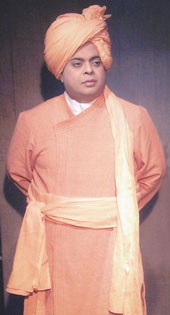 |
| Shekhar Sen in Vivekananda |
Hagiography is a well-established genre of Indian theatre, particularly in the folk and traditional forms. Its popularity spread to the urban stage, leading to massive 19th-century hits like Girish Ghosh’s Chaitanya or Bilwamangal Thakur, and on to the commercial cinema later, where such “saint films” as Sant Tukaram struck a gold mine at the box office. Shekhar Sen follows in this lineage, though living in more cynical times. No novice at this mode, he has swayed audiences to devotional ecstasy with his previous solo Hindi works, Goswami Tulsidas and Kabir. His latest, Vivekananda (presented by Sangit Kala Mandir and Ramakrishna Mission, March 14-15), differs in that the subject belongs to modern recorded history, but his approach remains the same. He scripted, scored, acts and sings this two-hour monodrama with a combination of thorough research and emotional intensity.
The performance style — touching tearjerking levels of fervour — takes the city slicker some time to get used to, but once our minds stop quarrelling with it and accept it as the time-honoured Bhakti medium, we can appreciate Sen’s educational and musical double achievement. To those ignorant of Swami Vivekananda’s career, it provides a humanistic and anecdotal overview, from his curiosity as a youth and early association with the Brahmo Samaj to his experiences in America and his self-willed samadhi. Sen’s chief talent is his singing, an essential ingredient of the saint genre. His perfect delivery and never-faltering pitch, whatever the scale, make listening to the songs a pleasure.
In contrast, a trio of much shorter (and consciously post-modern) one-man shows in English, designed and directed by Parnab Mukherjee, took the floor at Padatik Little Theatre on March 19-20. Aaron Kahn, an American actor, produced Values Americans Live By. . Robert Kohls’ itemised text ran on the soundtrack as Kahn, virtually eschewing words, physicalised a subtext commenting on Kohls’ list of “American” values like punctuality, individualism and freedom of speech. The best effect in this theatre of images came when he ironically handed one chip apiece from a Lays packet as “a taste of America” to viewers, disavowing that “No one can eat just one.”
Janardan Ghosh commendably performed Kaspar Shredded and Dipped, an excerpt from Peter Handke’s influential Kaspar, on the concept and tyranny of language. Parallelling Kahn, he distributed paper cues for spectators to read out, involving them in the discourse. However, he was handicapped enormously by the condensation, which subtracted from Handke’s development of the full-length play, and by the pressure of acting solo.
Sandwiched between Kahn and Ghosh, Mukherjee merely narrated Mahasweta Devi’s story Breast-Giver with his predictable, ungrammatical ad-libbing. He should realise that an actor must change with every project, or he ceases to act.










